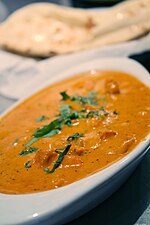Cuisine
British cuisine developed from various influences reflective of its land, settlements, arrivals of new settlers and immigrants, trade and colonialism. Celtic agriculture and animal breeding produced a wide variety of foodstuffs for indigenous Celts and Britons. Anglo-Saxon England developed meat and savoury herb stewing techniques before the practice became common in Europe. The Norman conquest introduced exotic spices into England in the Middle Ages.[541] The British Empire facilitated a knowledge of Indian cuisine with its "strong, penetrating spices and herbs". British cuisine has absorbed the cultural influence of those who have settled in Britain, producing many hybrid dishes, such as the Anglo-Indian chicken tikka masala.[540][542]
British cuisine
British cuisine is the heritage of cooking traditions and practices associated with the United Kingdom. Although Britain has a rich indigenous culinary tradition, its colonial history has profoundly enriched its native cooking traditions. British cuisine absorbed the cultural influences of its post-colonial territories – in particular those of South Asia.[1][2]
In ancient times Celtic agriculture and animal breeding produced a wide variety of foodstuffs for the indigenous Celts and Britons. Anglo-Saxon England developed meat and savoury herb stewing techniques before the practice became common in Europe. The Norman conquest introduced exotic spices into England in the Middle Ages.[3] The British Empire facilitated a knowledge of Indian cuisine with its "strong, penetrating spices and herbs".[3] Food rationing policies put into place by the British government during the wartime periods of the 20th century[4] are widely considered today to be responsible for British cuisine's poor international reputation.[3]
Well-known traditional British dishes include full breakfast, fish and chips, the Christmas dinner,[3] the Sunday roast, steak and kidney pie, shepherd's pie, and bangers and mash. People in Britain, however, eat a wide variety of foods based on the cuisines of Europe, India, and other parts of the world. British cuisine has many regional varieties within the broader categories of English, Scottish and Welsh cuisine and Northern Irish cuisine. Each has developed its own regional or local dishes, many of which are geographically indicated foods such as Cornish pasties, the Yorkshire pudding, Cumberland Sausage, Arbroath Smokie, and Welsh cakes.
British cuisine is the heritage of cooking traditions and practices associated with the United Kingdom. Although Britain has a rich indigenous culinary tradition, its colonial history has profoundly enriched its native cooking traditions. British cuisine absorbed the cultural influences of its post-colonial territories – in particular those of South Asia.[1][2]
In ancient times Celtic agriculture and animal breeding produced a wide variety of foodstuffs for the indigenous Celts and Britons. Anglo-Saxon England developed meat and savoury herb stewing techniques before the practice became common in Europe. The Norman conquest introduced exotic spices into England in the Middle Ages.[3] The British Empire facilitated a knowledge of Indian cuisine with its "strong, penetrating spices and herbs".[3] Food rationing policies put into place by the British government during the wartime periods of the 20th century[4] are widely considered today to be responsible for British cuisine's poor international reputation.[3]
Well-known traditional British dishes include full breakfast, fish and chips, the Christmas dinner,[3] the Sunday roast, steak and kidney pie, shepherd's pie, and bangers and mash. People in Britain, however, eat a wide variety of foods based on the cuisines of Europe, India, and other parts of the world. British cuisine has many regional varieties within the broader categories of English, Scottish and Welsh cuisine and Northern Irish cuisine. Each has developed its own regional or local dishes, many of which are geographically indicated foods such as Cornish pasties, the Yorkshire pudding, Cumberland Sausage, Arbroath Smokie, and Welsh cakes.



No comments:
Post a Comment